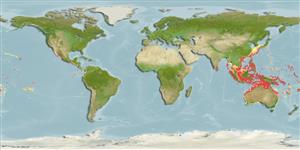Teleostei (teleosts) >
Eupercaria/misc (Various families in series Eupercaria) >
Labridae (Wrasses) > Bodianinae
Etymology: Bodianus: Bodianus after Bodiano or Pudiano, from the Portuguese pudor, meaning modesty (Jordan & Evermann, 1896); dictynna: Named for Dictynna, another name of Diana(goddess of the chase and the moon), in recognition of the extreme similarity and close relationship of this species with B. diana.
Environment: milieu / climate zone / depth range / distribution range
Ecology
Marine; reef-associated; depth range 5 - 100 m (Ref. 9823), usually 9 - 30 m (Ref. 75973). Tropical
Western Pacific: Indo-Malaysian Archipelago to Tonga, north to Japan, south to Australia; rarely occurs on the central Pacific geologic plate.
Size / Weight / Age
Maturity: Lm ? range ? - ? cm
Max length : 14.4 cm SL male/unsexed; (Ref. 75973)
Reported to be almost always associated with living coral reefs and juveniles are often found near black coral and gorgonians (Ref. 75973). Juveniles often shelter near black corals and gorgonians; also frequent cave ceilings (Ref. 8631). Feed mainly on benthic invertebrates such as mollusks and crustaceans. Juveniles regularly remove parasites from other fishes (Ref. 48636). Oviparous, distinct pairing during breeding (Ref. 205).
Life cycle and mating behavior
Maturity | Reproduction | Spawning | Eggs | Fecundity | Larvae
Oviparous, distinct pairing during breeding (Ref. 205).
Gomon, M.F., 2006. A revision of the labrid fish genus Bodianus with descriptions of eight new species. Rec. Aust. Mus. Suppl. 30:1-133. (Ref. 75973)
IUCN Red List Status (Ref. 130435: Version 2024-1)
Threat to humans
Harmless
Human uses
Tools
Special reports
Download XML
Internet sources
Estimates based on models
Preferred temperature (Ref.
123201): 24.1 - 28.9, mean 27.6 °C (based on 446 cells).
Phylogenetic diversity index (Ref.
82804): PD
50 = 0.5000 [Uniqueness, from 0.5 = low to 2.0 = high].
Bayesian length-weight: a=0.01230 (0.00569 - 0.02662), b=3.05 (2.87 - 3.23), in cm total length, based on LWR estimates for this Genus-body shape (Ref.
93245).
Trophic level (Ref.
69278): 3.5 ±0.48 se; based on food items.
Resilience (Ref.
120179): High, minimum population doubling time less than 15 months (Preliminary K or Fecundity.).
Fishing Vulnerability (Ref.
59153): Low vulnerability (10 of 100).
Nutrients (Ref.
124155): Calcium = 78.6 [46.6, 133.3] mg/100g; Iron = 0.691 [0.408, 1.281] mg/100g; Protein = 18.4 [15.5, 20.5] %; Omega3 = 0.178 [0.113, 0.275] g/100g; Selenium = 29.2 [17.0, 50.9] μg/100g; VitaminA = 158 [48, 605] μg/100g; Zinc = 1.67 [1.15, 2.61] mg/100g (wet weight);
